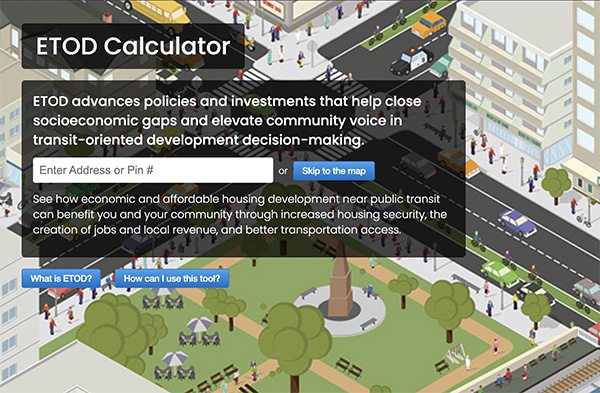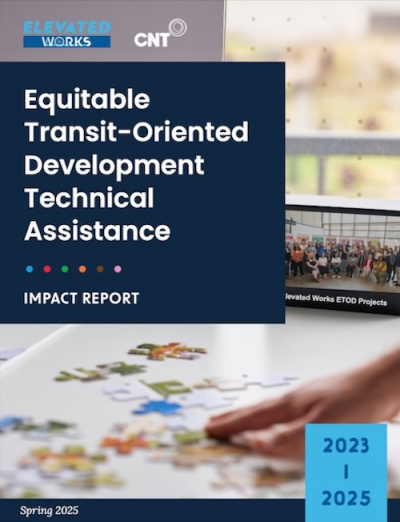
‘Neighborhood Technology’ equals community-powered solutions
Chief Strategy and Program Officer Miriam Savad, above (at a CNT planning retreat) led our recently-completed theory of change, impact framework and strategic plan process. By Miriam Savad 2025 was by all accounts a disruptive year, ushering in a wave of instability. Yet amid this challenging time, CNT still carved out time to reflect on the purpose and direction of our work: our work is to equitably change systems to support more just, resilient, sustainable and... Continue reading »
Community Advisory Committees that work: What does it look like when government agencies ‘walk the walk’ of gathering community feedback?
Planning, transit, and other agencies often work with Center for Neighborhood Technology to facilitate or develop processes to gather feedback or solicit input for infrastructure and other projects. One way we're sharing this work is through the recently released Community Accountability Framework tool to evaluate the success of such efforts. This builds on past work, such as our 2024 publication Equity in Practice: Strengthening Transit through Community... Continue reading »
Accountability Framework: a tool for more meaningful engagement and participatory democracy
Since 2019, members of the Transportation Equity Network (TEN) coalition have stayed true to its mission to increase interaction between BIPOC-led community-based organizations (CBOs) in historically disinvested communities with transportation decision-makers. Based in part on our experience coordinating TEN, this fall Center for Neighborhood Technology released two new tools, the Community Engagement Evaluation Framework and Our Voice, Our Budget, A guide to participatory budgeting in... Continue reading »
Truck Portal 2.0: New counts, new neighborhoods, same news
Last year we made news by simply counting the number of trucks and buses that go through our neighborhoods. We’ve continued counting and we’re working now to use truck count data to model diesel exhaust pollution. We’re also continuing to share the data in community and to make the data more accessible to all. In a sense, these data are nothing new: they merely validate the lived experience of people in hyper-industrialized communities across the city. But the need to... Continue reading »
Future of Western Avenue Public Transit Town Hall
A room full of constituents from Brighton Park, Pilsen, McKinley Park, Rogers Park, La Villita, and other neighboring communities gathered in the McKinley Park Fieldhouse May 29 to discuss the future of Western Avenue public transit – a kick off in a spring and summer of work to advocate for improvements along the corridor. Frustration and hope at town hall Presenters explained the Chicago Department of Transportation (CDOT) and the Chicago Transit Authority’s (... Continue reading »
Public procurement and contracting: can Milwaukee set new inclusion standards?
Local governments hold a tremendous amount of power and responsibility, anchoring nearly all public spending on water operations and capital improvements. Milwaukee is a model for the nation in many ways, however, access to water-related jobs and contracts for all in the Milwaukee water sector remains an ongoing challenge, according to our new report, Public Procurement and Contracting in Milwaukee's Water Sector. The report highlights that good-faith efforts to share opportunities to... Continue reading »
Reflection: with Elevated Works, we’ve built more than buildings
Director, Urban Analytics Emily LaFlamme shares a personal essay on our equitable transit-oriented development work: With the release of our Elevated Works 2025 Impact Report Bridging Visions, Accelerating Impact I’ve been reflecting on lessons learned about the state of equitable transit-oriented development (ETOD) and technical assistance. When we started Elevated Works in 2023 shortly after the Connected Communities Act passed, it felt more like a movement moment than a program... Continue reading »
With urban flooding, ponds and puddles do nearly as much harm as one big wave
The risk of urban flooding is not one big wave, but thousands of ponds and puddles. Deep-water accumulations on streets and under viaducts, in parking lots, basements, and yards can make one street impassable while one street over is relatively dry. Urban flooding—when the local sewer system cannot cope with the amount of rain during a storm—will get worse due to climate change, causing more severe storms, and increased development, creating more impervious surfaces. ... Continue reading »
'I can find out what’s really happening:' Academy provides urban planning insight
Urban planning shapes decisions about what gets built, where, and planner-driven policies and processes affect much of how we experience our neighborhoods. But typically, only professionals in the field, know much about urban planning principles and ideas or development processes. One way to change that: spread the knowledge. That’s just what the first Chicago Community Planning Academy that Chicago Architecture Center and Center for Neighborhood Technology, which wrapped in... Continue reading »
Evanston Green Homes retrofit sees partners work together and triple bottom line fall into place
For homeowner Adam Blough, the March 2025 all-electric, nearly $60,000 retrofit his house received through the Evanston Green Homes program to help owners of affordable homes reduce greenhouse gas emissions is one sign among many of the historically Black community’s renaissance. “This is the best place to be in Evanston,” Blough said during a tour he led recenltly for Evanston Mayor Daniel Biss, Fifth Ward Alderman Bobby Burns, journalists from the Evanston Roundtable... Continue reading »





 Strengthening Transit Through Community Partnerships
Strengthening Transit Through Community Partnerships








